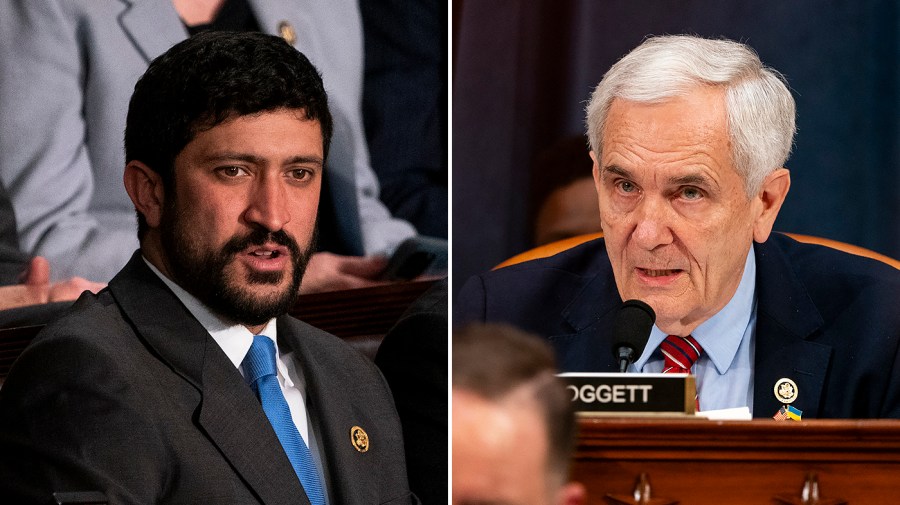Texas Democrats are facing the prospect of an internal primary battle as the state legislature moves to pass a new congressional map. This redistricting effort is set to position incumbent Representatives Lloyd Doggett and Greg Casar against each other in a single district, sparking concern within the party about the implications for its unified front heading into the 2024 elections.
The proposed congressional map, which would add five new seats for Texas Republicans, consolidates Doggett and Casar into one district in the Austin area. This potential showdown would see the 78-year-old Doggett, who previously called on President Joe Biden to withdraw from the 2024 race, face the younger, 36-year-old Casar, who chairs the Congressional Progressive Caucus.
In a twist that many Democrats perceive as ironic, Doggett is urging Casar to consider running in the newly redrawn 35th district instead. Some party members interpret this as Doggett conceding before the finalization of the new map. The concerns extend beyond individual aspirations, with Democrats worried that a divisive primary could weaken their overall efforts against Republican candidates next year.
In a recent interview with The Hill, Doggett stated, “It’s certainly a battle that is unfortunate to divide Democrats at a time when we need to be united against Trump.” He emphasized that he does not anticipate a particularly aggressive campaign, although he acknowledged his financial readiness. “That money was raised for my reelection and I plan to use it as necessary,” he noted, referring to his campaign funds totaling $6.2 million.
The tension escalated earlier this week when Doggett communicated to his supporters that the new 35th district would be based in San Antonio, hinting at its potential for Casar due to the area’s 57 percent Hispanic population. However, Casar’s chief of staff, Stephanie Trinh, asserted in a response that Casar is focused on contesting the redistricting efforts and supporting state legislators resisting Republican initiatives.
Trinh rebutted Doggett’s assertion about the district’s demographics, stating, “Other than the fact that Republicans arbitrarily assigned this seat the same number as Greg’s current one, there’s no reason it would make sense for Greg to run in that district.” She highlighted that the merged Austin-based 37th district would retain nearly 250,000 of Casar’s current constituents, along with his former city council seat.
Currently, Casar represents Texas’s 35th congressional district, which includes parts of Austin and the San Antonio metropolitan area, while Doggett represents the 37th district, primarily encompassing Austin and its suburbs. Under the proposed maps, the 37th district is expected to be more Democratic, while the 35th would lean conservative, containing less than 10 percent of Casar’s current constituents.
Long-serving in Congress for nearly 30 years, Doggett has represented various districts, including the 10th, 25th, 35th, and now the 37th. Democratic strategist Chuck Rocha remarked on the situation’s irony, particularly in light of Doggett’s past calls for Biden to consider stepping down due to concerns over age and effectiveness. “This would be an easy way for Lloyd to step down,” Rocha suggested, reflecting a broader frustration within the party regarding generational change.
Activist David Hogg, involved with the group Leaders We Deserve, echoed these sentiments, stating that Doggett should “take his own advice and pass the torch.” Hogg criticized the situation, attributing it to the actions of Texas Governor Greg Abbott, which he views as obstructing progressive candidates.
Despite the surrounding controversy, Doggett maintains that his opposition to Biden’s candidacy was rooted in concerns about electability rather than age. He defended his position, stating, “The fact that I was not starting a career was, I think, an asset in being able to speak truth to power even within my own party.”
As the narrative unfolds, Doggett continues to argue that the new 35th district offers a significant opportunity for Casar, emphasizing its majority Hispanic demographic. “He is the incumbent. He has the power to bring all of his talent and his resources to bear on this district and demonstrate that we don’t have to surrender it to Trump,” Doggett asserted.
Conversely, Casar’s supporters, including members of the Congressional Hispanic Caucus, are prepared to rally behind him. One Latino strategist described Doggett’s suggestion for Casar to abandon Austin as “insulting and out of touch,” underscoring the importance of representation in the community Casar was elected to serve.
This emerging situation continues to provoke discussions among Democratic leaders, with Rocha noting that the topic has generated significant conversation within Latino leadership circles. “I think there is almost a 100-percent consensus that he will have robust support,” he stated, hinting at the potential for unity among progressive factions in the face of Republican challenges.
As the Texas legislature moves forward with its redistricting plan, the implications for both Doggett and Casar remain uncertain, but the stakes for the Democratic Party are clear. The need for cohesion and strategy is paramount as they navigate an increasingly polarized political landscape.
